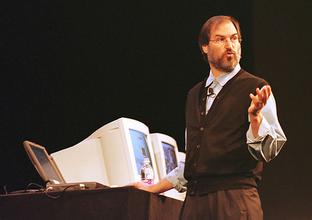Jobs confided in Sculley that he believed he would die young,
喬布斯向斯卡利坦言,他認(rèn)為自己年輕的時(shí)候就會(huì)死去,
and therefore he needed to accomplish things quickly so that he would make his mark on Silicon Valley history.
因此他需要盡快取得成就,在硅谷的歷史中留下自己的名字。
"We all have a short period of time on this earth,"
“我們?cè)诘厍虻臅r(shí)間都很短,”
he told the Sculleys as they sat around the table that morning.
那天早上圍坐在桌旁的時(shí)候,喬布斯告訴斯卡利,
"We probably only have the opportunity to do a few things really great and do them well.
“我們或許只有機(jī)會(huì)做幾件真正偉大的事情,并把它們做好。
None of us has any idea how long we're going to be here, nor do I,
我們誰也不知道自己能活多長(zhǎng)時(shí)間,我也不知道,
but my feeling is I've got to accomplish a lot of these things while I'm young."
但是我感覺必須趁著自己年輕,多取得一些成就。”
Jobs and Sculley would talk dozens of times a day in the early months of their relationship.
在他們建立友情的最初幾個(gè)月里,喬布斯和斯卡利每天都會(huì)聊很多次。

"Steve and I became soul mates, near constant companions," Sculley said.
“史蒂夫和我成了知己,就像永遠(yuǎn)的伴侶一樣,”斯卡利說道,
"We tended to speak in half sentences and phrases."
“我們傾向于只說半句話或半個(gè)短語就夠了。”
Jobs flattered Sculley.
喬布斯不斷地討好斯卡利。
When he dropped by to hash something out, he would say something like "You're the only one who will understand."
他每次造訪斯卡利跟他探討一些問題時(shí)都會(huì)說“你是唯一能理解的人”。
They would tell each other repeatedly, indeed so often that it should have been worrying,
他們反復(fù)告訴對(duì)方在一起共同工作多么快樂,
how happy they were to be with each other and working in tandem.
事實(shí)上他們這些話說得太頻繁了,頻繁得甚至令人擔(dān)心。
And at every opportunity Sculley would find similarities with Jobs and point them out:
一有機(jī)會(huì)斯卡利就會(huì)尋找自己和喬布斯的相似之處并指出來:
We could complete each other's sentences because we were on the same wavelength.
我們志趣相投,因此能夠說出對(duì)方?jīng)]說完的話。
Steve would rouse me from sleep at 2 a.m. with a phone call to chat about an idea that suddenly crossed his mind.
史蒂夫會(huì)在凌晨?jī)牲c(diǎn)鐘打電話叫醒我,和我聊他突然想到的一個(gè)點(diǎn)子。
"Hi! It's me," he'd harmlessly say to the dazed listener, totally unaware of the time.
“嗨!是我。”他會(huì)這樣對(duì)一個(gè)迷迷糊糊的聽話人說他毫無惡意,只是完全沒有意識(shí)到當(dāng)時(shí)是幾點(diǎn)。
I curiously had done the same in my Pepsi days.
很奇怪,我以前在百事的時(shí)候也干過這種事。
Steve would rip apart a presentation he had to give the next morning, throwing out slides and text.
史蒂夫會(huì)把他第二天早上要作的一個(gè)演示拆得七零八落,刪除一些幻燈片和文字。
So had I as I struggled to turn public speaking into an important management tool during my early days at Pepsi.
而我早年在百事的時(shí)候也這么做過,試著將公眾演講變成一個(gè)重要的管理工具。
As a young executive, I was always impatient to get things done and often felt I could do them better myself.
作為一名年輕的主管,我總是急不可耐地要把事情做完,并且常常覺得要是自己來做肯定比別人做得好。
So did Steve. Sometimes I felt as if I was watching Steve playing me in a movie.
史蒂夫同樣如此。有時(shí)候我感覺自已在看一部電影,而史蒂夫在片中扮演的就是我。
The similarities were uncanny, and they were behind the amazing symbiosis we developed.
我們倆異乎尋常地相似,這推動(dòng)著我們之間那種令人驚嘆的合作關(guān)系不斷發(fā)展。


